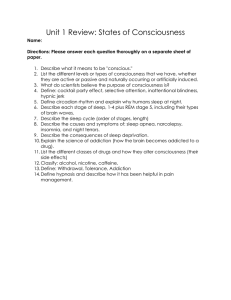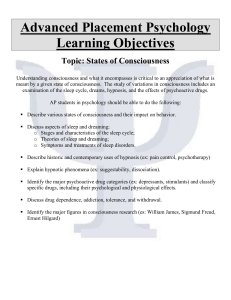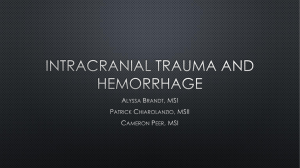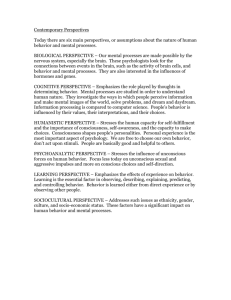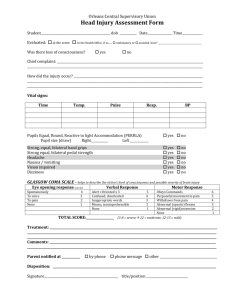The Study of Consciousness
advertisement
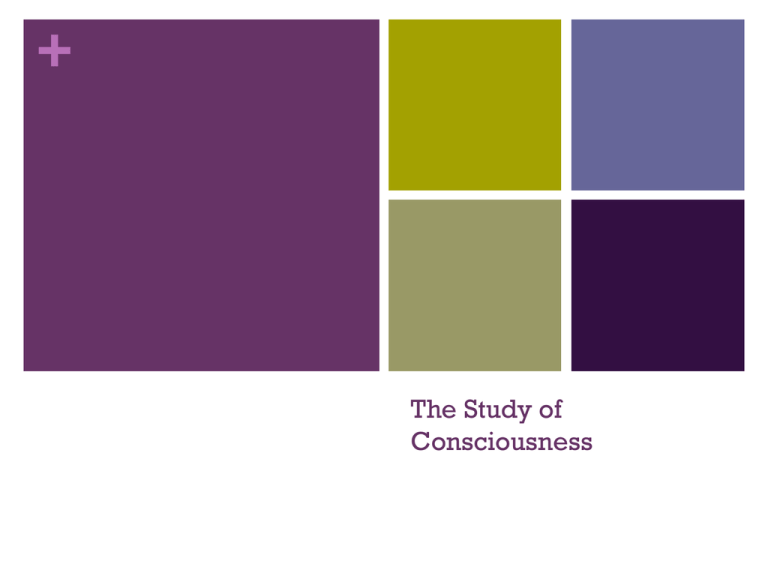
+ The Study of Consciousness + Consciousness Consciousness means the awareness of things that are both inside and outside ourselves. American Psychologist William James coined the term “Stream of Consciousness” highlighting the simple fact that consciousness has an ever-changing, shifting and elusive nature. + Meaning of Consciousness Generally speaking, consciousness means awareness, but there is more than one type of awareness. Psychologically speaking there are two types of consciousness: Sensory Awareness Inner Awareness + Consciousness as Sensory Awareness Our senses help us to become aware of our environment. See dew drops on blades of grass on a cool morning. Hear Mr. Dixon’s voice Smell Pizza in the Cafeteria Because our senses play such a large role in this type of consciousness, one meaning of consciousness must be Sensory Awareness + Selective Attention Focusing on a particular stimulus to one of your senses is referred to as Selective Attention To pay attention to this lecture you must filter out the clicking of keys around you. To do homework you must pay more attention to it over the music in your ears. We may even be able to pick up the speech of a single person across a room at a party. We tend to be more conscious of some things than others. Specifically sudden changes, unusual stimuli, and intense stimuli Cool breeze in a warm room, A boy in the girls restroom, a monkey in the classroom, Bright colors, loud noises, sharp pains + Consciousness as Inner Awareness Thoughts, Images and Emotions are often stored deep within us. We have the ability to recall these things and they affect our moods and feelings. Psychologists call this level of awareness Direct Inner Awareness. Some of these feeling are more forward and pronounced, Anger for instance Some are less up front. Perhaps remember a former best friend that you have grown away from. Thinking of Abstract Concepts such as fairness. + Levels of Consciousness So far we have only discussed one level of consciousnessthe level at which people are aware of something. But many psychologists speak of other levels of consciousness. These include preconscious, the unconscious, and the nonconscious. + The Preconscious Level Preconscious ideas are not in your awareness now, but you could recall them. What did you wear yesterday? What did you do last night? What was the last funeral you went to? How did you feel? You can make these preconscious bit of information conscious by directing your inner awareness, or attention, to them. + The Unconscious Level Many psychologist have been influenced by the theories of Sigmund Freud. Freud theorized that people have an unconscious mind. This information is stored in the unconscious and is unavailable to awareness under most circumstances. In other words, this information is hidden from the the conscious mind. Certain painful memories and impulses such as aggressiveness are often considered unacceptable so our minds repress them until they are no longer available to consciousness. We use various mental strategies called defense mechanisms to push painful or unacceptable ideas out Protects us from feelings of anxiety, guilt, and shame + The Nonconscious Level Many of our basic biological functions exist on a nonconscious level. Even if you tried, you cannot sense your fingernails or hair growing. You know that you are breathing in and out, but you cannot sense the exchange of carbon dioxide and oxygen. + Altered States of Consciousness Altered State of Consciousness- when a person’s sense of self or sense of environment changes. Dozing Off in Class Medication Hypnosis Drug Effects + + Questions What are two examples of ideas that are not in your awareness right now but can be recalled? How does an altered state of consciousness differ from the other three levels at which awareness is limited Do you think a person can study or understand the consciousness of another person? Explain Give examples of each level of consciousness. At least three each. + Dreams. . . + The Sleep Cycle Circadian Rhythms Latin words circa and dies meaning about and day. Circadian Rhythms for humans include a sequence of bodily changes Body temperature Blood pressure Sleepiness Wakefulness Normally associated with the rotation of the Earth, 24 hours When cues are removed that signal day/ night humans tend to expand their circadian rhythms to 25 hour days + Stages of Sleep Stage 1- lightest stage- mostly remember everything 30-40 mins Progress deeper into stages 2,3,4 After about 30 mins in stage 4 we descend quickly 3-2-1 REM Rapid Eye Movement Heart rate rises, brain activity increases Deepest, most restful stage of sleep + Stages of Sleep Stages 1-4 and back down with the addition of REM at the end is considered a single Sleep Cycle. Typically we go through an entire sleep cycle 4-5 times during a full night’s rest. As we move through the cycles, stages 1-4 become shorter and REM lengthens. + Dreams The most vivid, detailed dreams happen in the REM cycle In the other four stages the plots of our dreams tend to be vaguer, more confusing and the images are more fleeting. We have difficulty recalling many of our dreams because our brains do not easily hold on to information when we transition through stages of consciousness, in this case sleeping and waking. + The Freudian View Freud believed that the deepest desires and urges of the Unconscious or the Id are often revealed in dreams. Believed dreams were symbolic of something much deeper in a person’s heart and psyche. + Biopsychological Approach Some psychologist believe dreams begin because of biological not psychological activity. During Sleep, neurons fire in a part of the brain that controls movement and vision. These neuron bursts are random and the brain tries to make sense of them by weaving them into a story- hence a dream.
